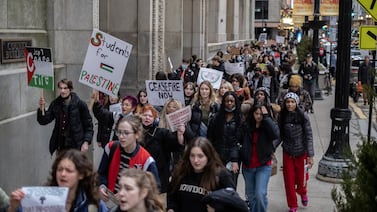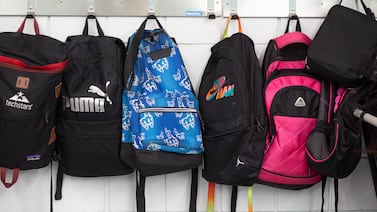At a state school board budget hearing Wednesday, Alex Parker, a fourth-grade teacher at Cossitt Avenue Elementary School in suburban LaGrange, told the story of a new teacher getting thrown into virtual learning this fall without proper training after her prep program was cut short by the coronavirus pandemic.
“She’s learned to be a classroom teacher with an incomplete foundation from a teacher preparation program,” said Parker, who met the educator through a Teach Plus Illinois mentor program. “The story of this educator is not idiosyncratic. In fact, there are 4,000 newly licensed teachers in the state facing similar challenges.”
Parker recommended to the board that $8 million be put toward supporting new teachers. He was one of about 20 educators, advocates, and district leaders who testified at a virtual state board of education hearing Wednesday that the coronavirus pandemic has exacerbated some of the inequities felt by school administrators, teachers, and students.
Dan Cox, superintendent of Rochester CUSD 3A in central Illinois, prefaced his remarks by saying he has attended the Illinois board of education’s budget hearings for the past several years. This year, he asked the board to invest $450 million more in local school districts around the state.
“We know that funding matters by looking at evidence. Students in the top 20 funded school districts are two times more likely to meet state standards of math and one-and-a-half times more likely to meet state standards in reading than students in the bottom 20 of the adequately funded districts,” Cox said.
It’s unlikely, however, that school districts’ leaders and advocates will see an increase in state funding anytime soon. The pandemic has made Illinois’ shaky financial position worse. The governor has said he plans to hold school funding flat this year, but there are mounting concerns about the toll of plunging revenues on future budgets.
Jason Powell of ReadyNation, a workforce advocacy group that has begun lobbying around early childhood education, requested that the board invest $50 million in education for young learners. Noting that COVID-19 has impacted teachers and children, early childhood education had significant challenges prior to the pandemic that impacted education outcomes for students.
“Only three out of 10 kindergartners were considered fully ready for school last fall, according to a recent report from the state board. These figures improved slightly over the past couple of years, but they still lag far behind where we need them to be. Particularly in the case of low-income kids or children of color,” said Powell.
Lexi Mueller, a student who is invested in agricultural education, serves as state president of the Illinois Agricultural Education and FFA, where she represents the Valmeyer chapter. She recommended that the board continue to support agriculture education, specifically programs that prepare educators to teach the subject.
“By funding agriculture education, colleges and universities are able to increase enrollment of pre-service teachers, and our state in turn sees more graduates enter the workforce as agriculture educators,” said Mueller.
She added, “The cycle of teaching, inspiring, recruiting, and placing in schools will be continuous. But, if one of those elements (is not supported), the whole cycle suffers.”
Mueller told the board that she wanted to attend Southern Illinois University to be a high school agricultural teacher.
School administrators, educators, advocates and students will have more opportunities to suggest to the board what priorities they’d like to see supported in future spending plans. Illinois will hold two more virtual budget hearings on Oct. 14 at 1 p.m. and Oct. 16 at 1 p.m.








